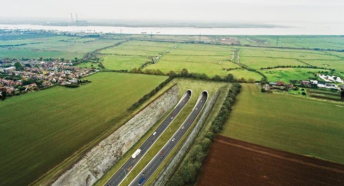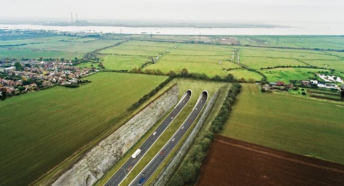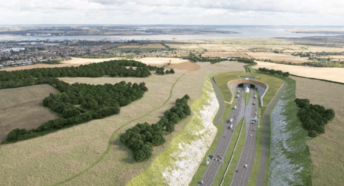We back call for review of Lower Thames Crossing plans
CPRE Kent is one of the organisations supporting a letter calling for a review of the Lower Thames Crossing, writes CPRE Kent’s Gravesham chairman Alex Hills.
At every stage of the consultation process, CPRE Kent has been asking for and been refused information that it needs so it could respond fully to that process
It took a Freedom of Information request to get National Highways to publish the business case for the crossing despite it saying for years how strong the case was it would not publish it.
In the plans the vital leisure and commuter walking and cycling route NCR 177 is being diverted south of the A2 as NH claimed there was no alternative as it was impossible to maintain a direct route. It turns that NH knew a direct route was possible.
When the DCO documents are published, how many more things are we going to learn that NH has been hiding?
The DCO documents are estimated to contain some 60,000 pages, which is why CPRE Kent is working with the Thames Crossing Action Group and other organisations in fighting the proposed crossing.
A coalition of conservation organisations and groups have written to the Secretary of State for Transport, Mark Harper, calling for an immediate review of the LTC. The scheme has been discussed in different forms for a number of years, but campaigners say it should finally be scrapped on the basis of cost, environmental and climate impacts.
The planned road scheme under the Thames would destroy veteran trees, irreplaceable ancient woodland and other habitats, increase nitrogen pollution, damage landscapes and increase carbon emissions.
These impacts would probably make this England’s most damaging road scheme for a generation, which is in stark contrast to claims by National Highways that it will be the “greenest road ever built in the UK”.
A range of natural habitats and landscapes in Kent and Essex are under threat, such as ancient woodland, the Kent Downs Area of Outstanding Natural Beauty and the mosaic of open habitats in the Thames estuary. But conservation organisations and the public have been left to guess the scale of impact. In addition, NH has only reluctantly released information regarding the scheme’s huge carbon footprint.
NH has just resubmitted its Development Consent Order application to the Planning Inspectorate. However, there are serious concerns that the level of detail provided to the public through the various consultations has been entirely unacceptable. Without adequate information, there has been a severe lack of meaningful public engagement and consultation on this scheme.
Over the past few years, the UK government has committed to address the ongoing climate and nature crises by setting targets in the Environment Act 2021 to halt species abundance decline and committing to reach net zero greenhouse gas emissions by 2050, with a 78 per cent reduction in emissions by 2035 and a 68 per cent reduction by 2030. Yet the scheme simply doesn’t match government rhetoric towards how we should be treating the environment in modern times.
The coalition is calling on Mr Harper to commit to an immediate review of the proposals in light of the ongoing flaws in the consultation and its failure to meet the government’s own environmental commitments.
Hilary Newport, CPRE Kent director, said: “CPRE Kent has been frustrated by the lack of key information provided every stage of the consultation process. The last statutory consultation was back in 2018 and since then there have been multiple design changes. It’s not reasonable to expect a project of this scale to go to examination without full detail of its impacts.”
Jack Taylor, of the Woodland Trust, added: “The loss of irreplaceable habitats and living legends is unacceptable. We’re fighting both a nature and climate crisis, and destruction of ancient woodland and veteran trees for a road scheme beggars belief.
“To make matters worse, we’re still waiting to find out just how much the scheme will impact our natural environment. National Highways has not disclosed details of which environmental features will be affected. Hiding these impacts from the public until the DCO stage is totally unacceptable.”
Meanwhile, Laura Blake, Thames Crossing Action Group chair, said: “The proposed LTC is a hugely destructive and harmful project on so many levels. It fails to meet the scheme objectives and would not solve the problems associated with the Dartford crossing – it is simply not fit for purpose.
“We are strong believers that ‘together we are stronger’ and we are proud to unite with so many others to voice our serious concerns and to call on government for an immediate review of the project.”
Friday, November 11, 2022









